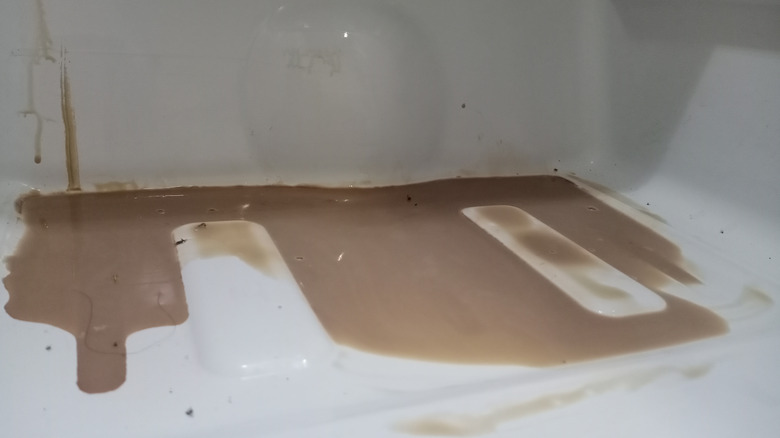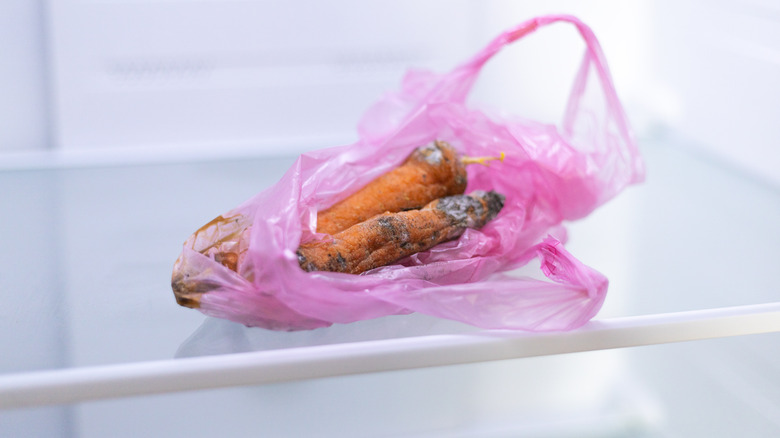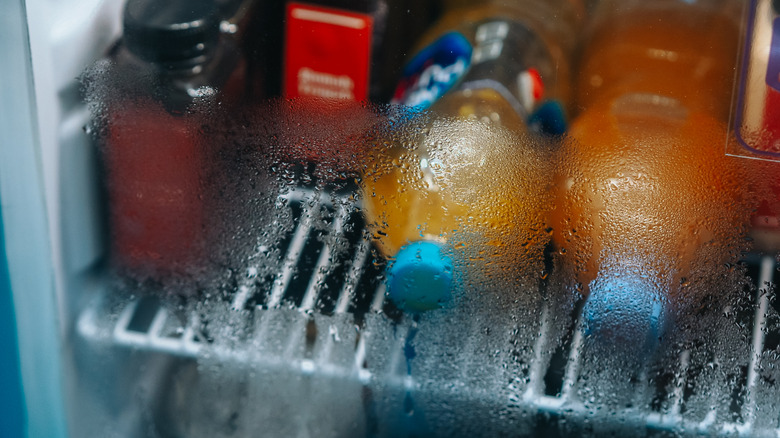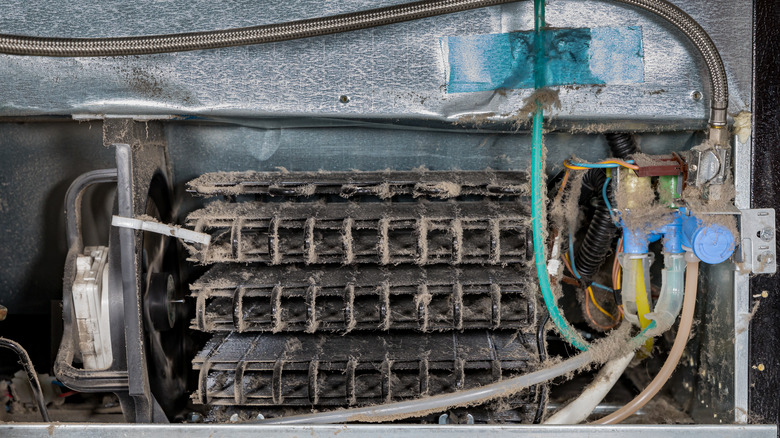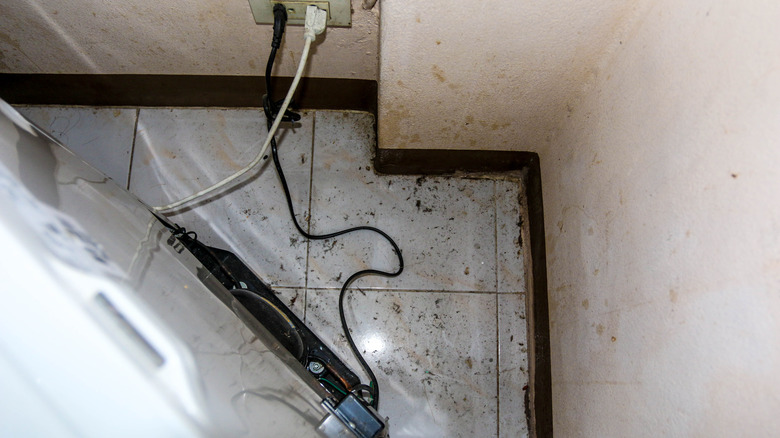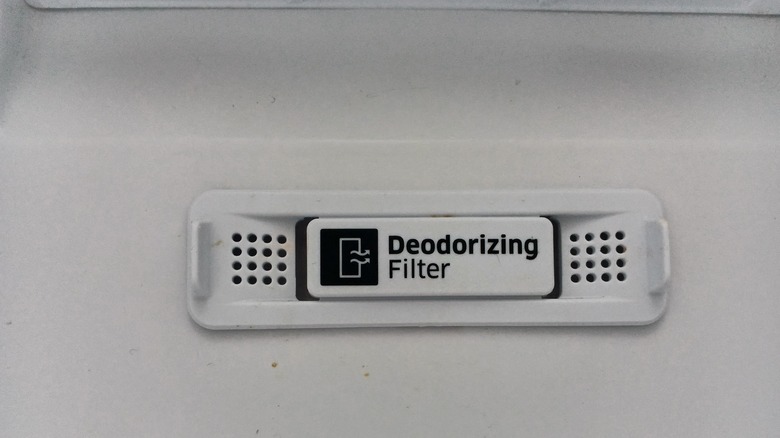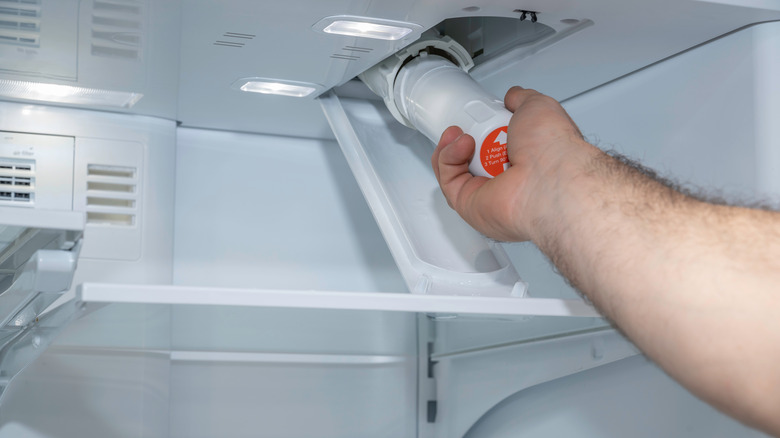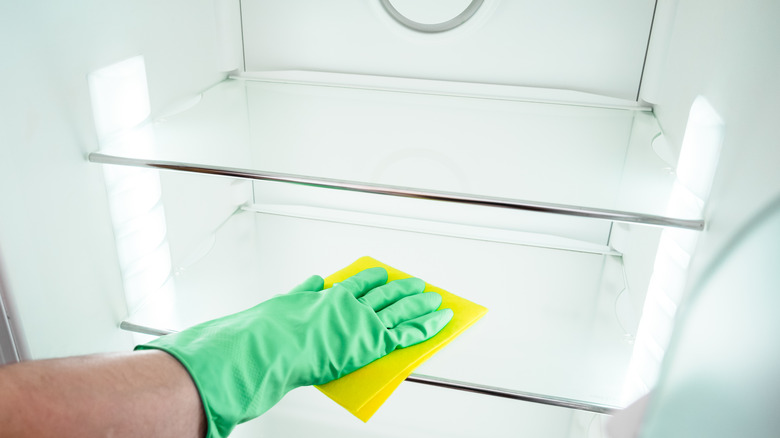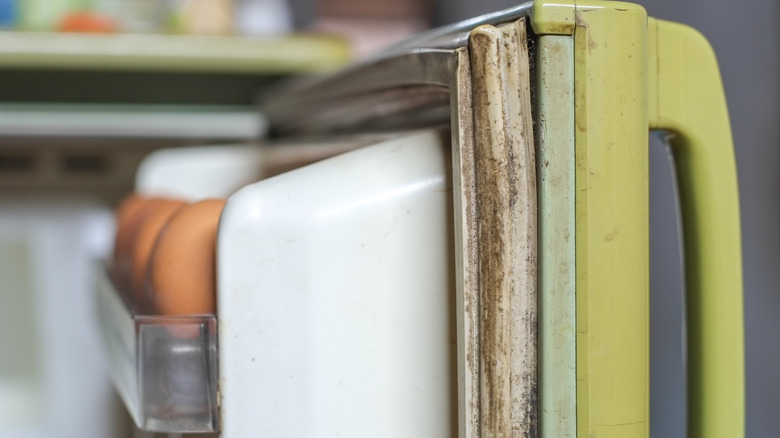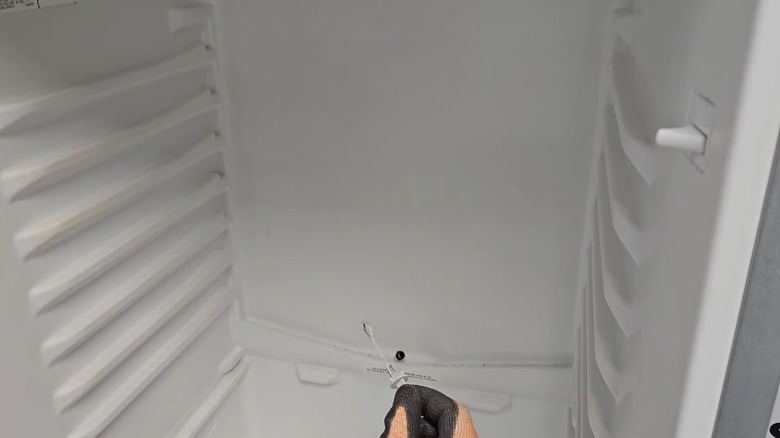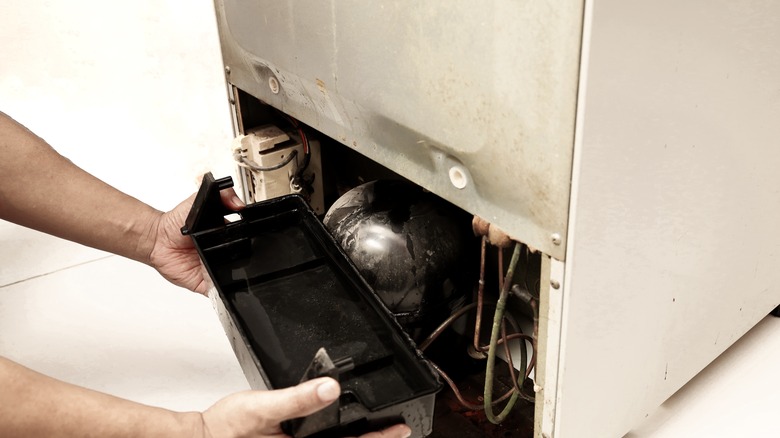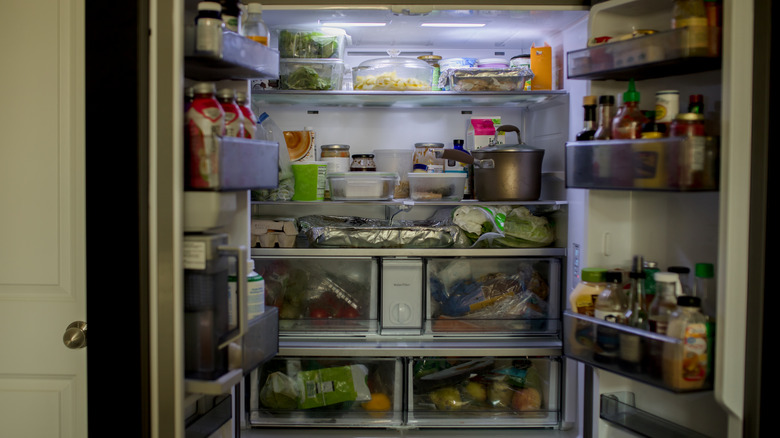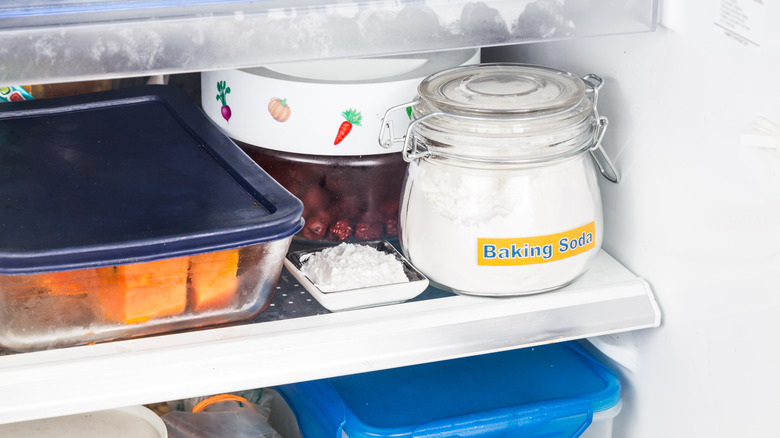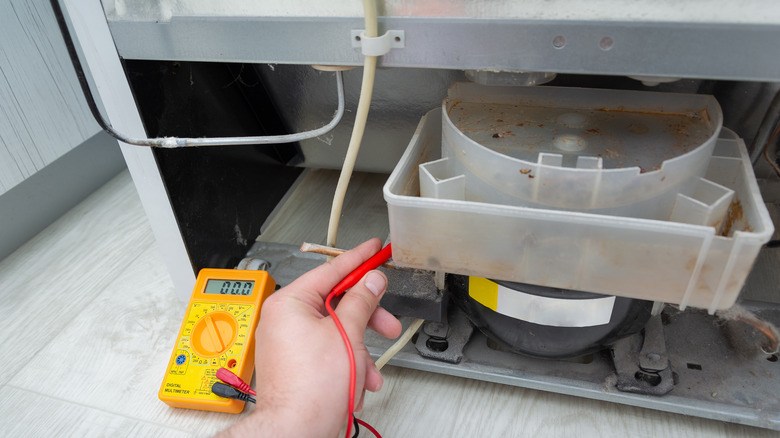Why Does My Fridge Smell? 23 Reasons For Those Rancid Odors
We may receive a commission on purchases made from links.
Opening your refrigerator's doors only to be met with strong odors can be unpleasant. While you can ignore the smell if it stems from leftovers stored inside (you're going to consume it soon, so why bother, right?), you can't overlook it if it's a perpetual condition. But to get rid of funky odors in your fridge, you must pinpoint the reason behind the stench. Otherwise, you'll be left playing the "what if" game. Is something rotten inside or has mold decided to bring over its brethren? Or, maybe, it's the dirty air filter, the overflowing drip pan, or the spill you forgot to take care of.
Being sure of the source of the smell will help you channel your energy in the right direction and take corrective action accordingly. For instance, if the smell is coming from your drip tray, you don't want to unnecessarily deep-clean your fridge ahead of schedule. Not only will this lead to extra work, but also not eliminate the malodor. Ready to turn your appliance into an odor-free zone and make your home smell better than ever? Here are 23 reasons why your cooling box might be smelling rancid. We've also included the remedial measures for each instance, so you aren't left hanging.
Not storing odor-causing food items adequately
Not storing odor-causing food items, like garlic, onions, smelly cheese, hard-boiled eggs, fish, and chopped or cooked cruciferous vegetables (such as broccoli and cauliflower), properly is a common reason why your fridge smells pungent. Putting them in open containers lets their strong aroma fill every corner of the appliance and give off an unpleasant fragrance when the door is opened. So, make sure you store them in airtight containers to contain their smell. But avoid using plastic ones since they don't seal in odors as well as glass ones do. Plus, the latter will keep your food fresh.
Not sealing the lids of your storage containers properly
Assigning a dedicated glass container, like Vtopmart's 8 Pack Food Storage Containers with Airtight Lids, to each of the smelly items in your fridge will have little impact if you aren't diligent about sealing the lid. The odor will escape the boxes and take up room in your refrigerator, impacting its freshness. This is why you should be careful about sealing the lid whenever you store a food item, especially if it's the smelly kind. In case a few containers have problematic lids, use them for storing non-smelly items only.
Not cleaning up spills and messes instantly
With your fridge housing a myriad of food, drinks, and condiments, you may sometimes accidentally spill something. While it's not a big deal, don't let the mess linger longer than necessary. If possible, wipe all the spills and messes as soon as they occur to minimize the growth of bacteria and other smell-causing germs. You also want to confirm that the spill didn't coat other stored items. In case it does, wipe it, too, to maintain a clean environment. Line your shelves with washable mats, such as Cyrico's 7 Pack Refrigerator Liners, to simplify cleanup.
Not throwing out food that's past its expiration date
It can be difficult to keep track of all the leftovers hogging your fridge's shelves. And, sometimes, food may spoil and make your appliance smell rancid. The same goes for items that expire without your knowledge. To ensure your cooling box doesn't give off bad odors, dedicate a shelf (or a small portion of it) to your leftovers. Write down the dates you got them to consume them before they go bad. Moreover, edit your fridge's contents every month or two and place items nearing their expiration dates toward the front.
Not wiping down your refrigerator after removing spoiled food
In case you aren't too diligent about consuming food that's about to expire, there's a good chance a few items will serve as a come-one, come-all dish for bacteria. In certain cases, you might even find mold growing unchecked. And even after you throw them away, the microorganisms can stay behind and make your fridge smell rotten. So, develop a habit of always scrubbing out a section hosting spoiled food with a dish soap and warm water solution. This simple step will eradicate them and keep your fridge from smelling nasty.
Not checking on food in the fridge regularly
Although you should throw out rotten food at once, what do you do with items that are spoiled but don't look the part? Since it can be easy to neglect them, you might miss out on the real culprits making your fridge stink. This is why it's a good practice to take stock of every item chilling inside and inspect it critically. You also want to turn certain ingredients, like vegetables and fruits, upside-down to ensure you don't ignore the festering parts. Do this every quarter or so to have a nice-smelling appliance.
Not wiping your fridge weekly
One of the first things you should do when you notice strange odors coming from your fridge is to wipe its interiors. This will keep germs from establishing a stronghold, and you can wipe away missed spills before they become a huge problem. Start by turning off the power and unplugging your refrigerator. Empty out the food and other perishables. Now, dilute a little dish soap in some warm water. Wipe down the shelves and compartments before going over them with a clean microfiber cloth to dry them. Then, plug it back in and place everything inside (after wiping them as well, of course).
Not removing moisture within the appliance
For the most part, there shouldn't be a moisture buildup within your cooling box. However, a stressed compressor, faulty fan, weak fridge door seal, or a worn-out startup relay can all give way to condensation within the appliance. If left unchecked, this will lead to the growth of mold and mildew, and your fridge will start smelling rank. Worse, the food inside may be affected and unsafe for consumption. So, conduct an occasional check of your appliance and always wipe away excess moisture. In case this becomes a permanent issue, call a technician for help.
Not cleaning your refrigerator's evaporator coils
Since they're located at the back of your refrigerator, it's possible you miss cleaning the evaporator coils. But letting dust bunnies and hair clumps have their way with these loops can have an adverse effect on your appliance. This is because your fridge and freezer might not cool adequately and start giving off a putrid odor. The low temperatures might also cause some food items to spoil faster, adding fuel to the smelly fire. This is why you should wipe this out of sight, out of mind place you're forgetting to clean half-yearly or quarterly if you have pets.
Not vacuuming under your refrigerator
Another spot you might be overlooking is the space under your refrigerator. Forgotten food particles and accumulated dust can quickly start smelling, forcing you to blame your device for the foul odor. To avoid this outcome, vacuum under your appliance every quarter. Don't think it's possible to pull out your heavy fridge every three months? Slip on a flat attachment over your vacuum to get into the nooks and crannies without issues. However, if you don't have it handy, use a quick sock hack to easily clean under your large appliance.
Not replacing the air filter regularly
If you've recently purchased a new refrigerator, chances are it has an air filter either behind the topmost shelf or the ceiling. Although its primary function is to clean the air being circulated in the device and minimize food-related stenches, it can become a source of smell if you don't replace it (cleaning might help, too, if the model allows) regularly. Generally, you'll have to undertake this activity twice each year (or per your manufacturer's instructions). But you may have to change the filter sooner if your fridge keeps smelling bad on the regular.
Not switching out the water filter on time
Your fridge's water filter (for the ice maker or water dispenser) is an overlooked kitchen appliance you're forgetting to clean. And if you don't switch it out for a new one at the desired time, it can lead to foul smells in the cooling box. Usually, you should replace it half-yearly, but the actual frequency will depend on the quality of water, your refrigerator's make and style, and how often you use it. Bring out your user manual to locate the filter, remove the old one, and fit in a new model seamlessly.
Not deep cleaning the appliance quarterly
Even if you keep up with the weekly wipe down, you'll still have to deep clean your refrigerator every quarter to keep bad odors at bay. This is because the latter involves a thorough cleanup and will help you eliminate mold spores or bacteria hiding on the underside of shelves or in tiny corners. So, every three months, unplug the device and empty its contents. Remove the detachable shelves and scrub them using warm, soapy water. As for the interiors and built-in drawers, try this easy vinegar hack for a squeaky-clean fridge.
Not keeping your refrigerator's gasket clean
A gasket, or seal around your fridge's door, is responsible for keeping cold air in and warm air out. However, the rubber seal can get covered in rogue food matter and be an innocent victim of liquid spills after a while. And letting it remain dirty will give way to stomach-turning odors. To ensure that doesn't come to pass, get some warm water and add a few drops of one of the best dish detergents. Dip a clean microfiber cloth in the mixture and wipe the gasket prior to drying it with a dry cloth.
Not clearing out a blocked drainage hole
A drainage hole is situated towards the back of your refrigerator (or freezer) and takes care of the water formed during defrost cycles or day-to-day condensation. However, it can get blocked over time, courtesy of mineral deposits and ignored spills. This makes it difficult for the water to drain out of the appliance, and it starts pooling, giving way to an unpleasant stench. In case you notice such an occurrence, take off the cover and immerse a cotton bud in distilled white vinegar. Then, use it to gently clear the opening. In case this doesn't help, call a technician to check the drain lines.
Not emptying the drip tray
There's a tray located on the back of your fridge (check the top of your compressor) that collects condensation from the drain hole. Generally, water evaporates from the open pan and isn't much of an issue. However, if your device generates more water than is being evaporated, this drip pan will fill up over time and start smelling bad. So, if you notice spilled water around your appliance (and aren't sure of the source), unplug it and check the drip tray. If it looks nasty, pull it — shimmying it from side-to-side helps — and give it a warm, soapy bath.
Not allowing room for air circulation
Sometimes, it's you, not the appliance, who's at fault for the putrid odor. Cramming the shelves tightly and not allowing room for air circulation will encourage odors. An easy way out is to eye everything you have inside and determine whether each of them deserves a spot. Chuck out anything that will be fine in your pantry (like pulses and raw pasta) to open up a little space for the deserving candidates and promote airflow. Bonus advantage: A well-organized fridge will make it easier for you to track everything that's inside and consume items before they go bad.
Not adjusting your fridge's temperature
Even though you might not pay much attention to your fridge's temperature, it can mean the difference between your appliance smelling fresh and rancid. To elaborate, high temperatures will encourage the growth of bacteria and speed up food decomposition, causing your cooling box to smell putrid on the regular. To avoid this outcome, try keeping the temperature from 33 to 40 degrees Fahrenheit (0 to 4 degrees Celsius) and your freezer about -0.4 degrees Fahrenheit (-18 degrees Celsius). Not sure how to go about it? Check for instructions in your owner's manual.
Not airing out your appliance
A lack of fresh air can also be a reason why your sealed appliance gives off a putrid odor. To air out your appliance, unplug it, empty its contents, and leave the door open for an hour or two. Don't forget to keep a separate cooling unit for your perishables (meat and frozen goods are a good contender). Or, you could channel your inner Joey from "Friends" and consume everything at once. To go the extra mile, mix water and distilled white vinegar in a 1:1 ratio, dip a cloth in the solution, and wipe down the interiors.
Not checking your freezer for absorbed smells
While your fridge is mostly responsible for bad smells emanating from it, don't discount the freezer unless you check it out personally. It's because leaked meat juices or temperature fluctuations can encourage spoilage and lead to a bad smell. In case it's the culprit, defrost it and remove everything. To give it a deep clean, combine hot water and distilled white vinegar in a 1:1 ratio, spray it around, and let it be for about 10 seconds. Dry the walls with a clean microfiber cloth and use baking soda (decant some into an open container) to absorb the lingering smell.
Not switching out your old deodorizer for a new batch
Placing natural deodorizers, such as baking soda, coffee grounds, citrus peels, and activated charcoal, in your fridge is a great way of keeping odd smells away. However, to ensure they do their assigned job properly, be sure to switch them out at regular intervals with a new batch. This is because they absorb odor-causing particles (instead of masking the stench) and lose their effectiveness with time. So, remember to switch out your old deodorizer for a new batch every week or two. Also, don't use the old batch anywhere else in your house (especially for cooking).
Not taking chemical-like smells seriously
If you have scrubbed out your fridge and eliminated all other possible sources of rancid odors in the device, you might be dealing with a Freon leak. This refrigerant may escape its confines and make its way to the front, giving off a strong chemical-like smell. Besides, it can contaminate your food and is bad for your health. Under these circumstances, try looking at the various parts of your appliance to nail down the source of the leak. Once you pinpoint the location, contact a professional and have them take a look at your refrigerator.
Not confirming if your refrigerator's plastic has absorbed smells
If none of the reasons above are responsible for the stench in your fridge, your refrigerator's plastic shelves and compartments might be to blame. This is because they absorb lingering odors and make the clean appliance seem dirty. In these cases, you can use distilled white vinegar to wipe the shelves and get rid of the odor. Placing baking soda in a vented container might help, too. But this will take a little time to work. For a more permanent fix, line the plastic shelves with washable mats.



